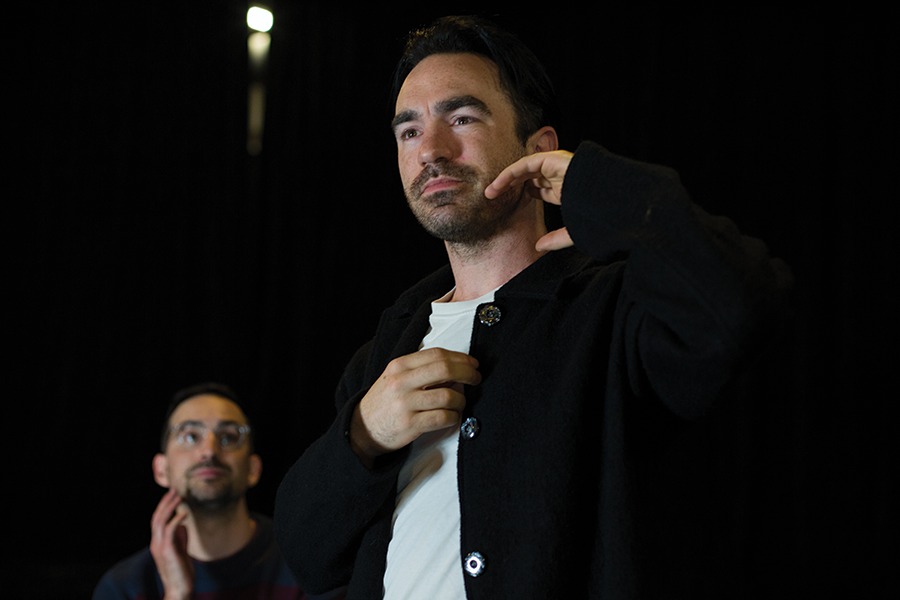
Tony Kushner's 1991 play Angels in America is one of the most celebrated theater works of the late 20th century—a Tony Award winner, Drama Desk winner, Pulitzer Prize winner. It's also one of the most daunting works to consider staging—especially for a smaller theater company—thanks to the sheer logistical challenges of the two-part epic. But for Utah Repertory Theatre Co. and its artistic director JayC Stoddard, factors started adding up to make it hard to resist.
Stoddard—who will also direct Utah Rep's production of Angels in America—recalls his own fascination with the show dating back more than 20 years, and how much he has looked forward to getting involved in its production. "It was probably around 1997 or '98 that I first came in contact with the script and fell in love with it. It blew me away," he says. "A few years later, I had a chance to see a production, and had the same reaction. I've seen it in production twice, plus the HBO adaptation. Every time, I knew that it was something I wanted to be involved in. At first, I thought about acting in it. But then, the more I thought about it, the more I wanted to take the lead on it as a director."
He also recognized, however, that it was, as he put it, "an incredibly intimidating script." Yet as Utah Rep began to plan for its upcoming season, Stoddard saw the right pieces all falling in to place. "The National Theater had just re-done [Angels in America], sort of coming back into the collective consciousness," he says. "We were getting into a place to do shows in the Rose Wagner Studio Theater. ... Then it just so happened that we'd booked the Rose to open a show on Pride weekend. We have Pride weekend, we have a space, and I have this story that's so perfect for so many reasons."
Part of that "perfection," unfortunately, involves a national climate that makes Angels in America feel particularly relevant again, despite being nearly 30 years removed from its creation. "The AIDS crisis is obviously not the crisis now that it was then," Stoddard says. "But the main villain in Angels is Roy Cohn, who was Donald Trump's mentor. You can't really get more relevant than that. We're still talking about hard-right issues as they affect people who don't necessarily align their views that way. One of the main characters is a Mormon who's still in the closet. That's so relevant to right here, and right now. We still face that battle. ... Nothing feels out of place, or out of time. The questions posed within the play are still things we need to be talking about."
Despite all of that obvious relevance, however, it was still important to Stoddard that they be able to do the show the right way—and for him, that meant being able to stage both parts of Angels in America as full productions. "Generally, when people do Angels, they do Millennium Approaches," he says. "But if they do Perestroika, they do a staged reading. To me, it felt like we could do Millennium in one season, and in the next, do Perestroika."
With the notion of doing Millennium Approaches in 2019 and Perestroika in 2020, there was still the matter of maintaining consistency between the two productions. Stoddard was able to get a commitment from not just the cast, but the entire creative production team—set design, lighting design, etc.—to participate next year as well. That carry-over, Stoddard believes, allows for richer subtext to be developed in this year's Millennium Approaches production.
"The message of the angel isn't even revealed until Perestroika," Stoddard says, "but we have to think about it this year. All of the things we already know the answers to, we get to lay the groundwork and plant the seeds, so that when they're revealed next year, they seem consistent."
While the centrality of the closeted gay Mormon protagonist Joe Pitt gives Angels in America an added relevance in Utah, Stoddard notes that he resisted leaning into that content for Utah Rep's production. "I think the story tells itself, honestly," he says. "It's a coming-out story, and so many people in our audience might have had that same conversation. I don't need to take a highlighter to it. The character's story tells itself in a way that people here can relate to on a fundamental level.
"The bigger part is not isolating anyone, but telling this very human story," Stoddard adds. "Whatever side of the political line you might be on, or your sexual identity, these people are very real, and their hearts are so big."